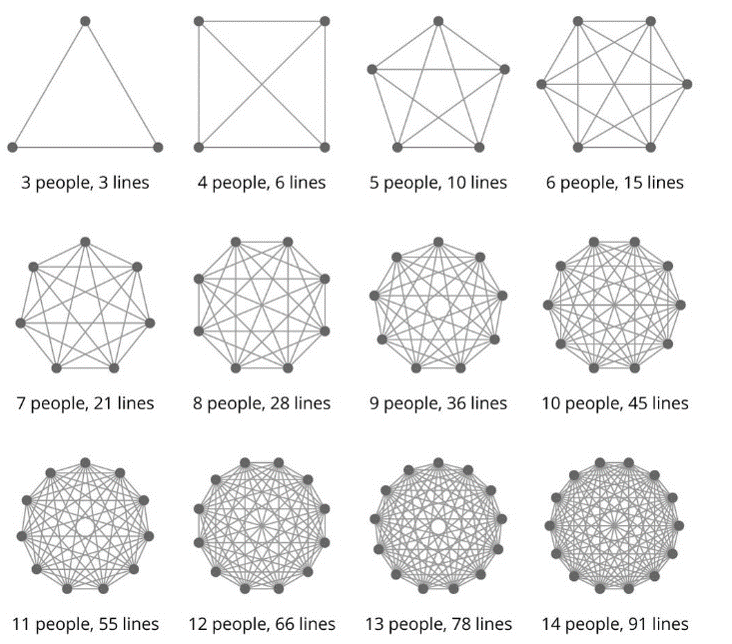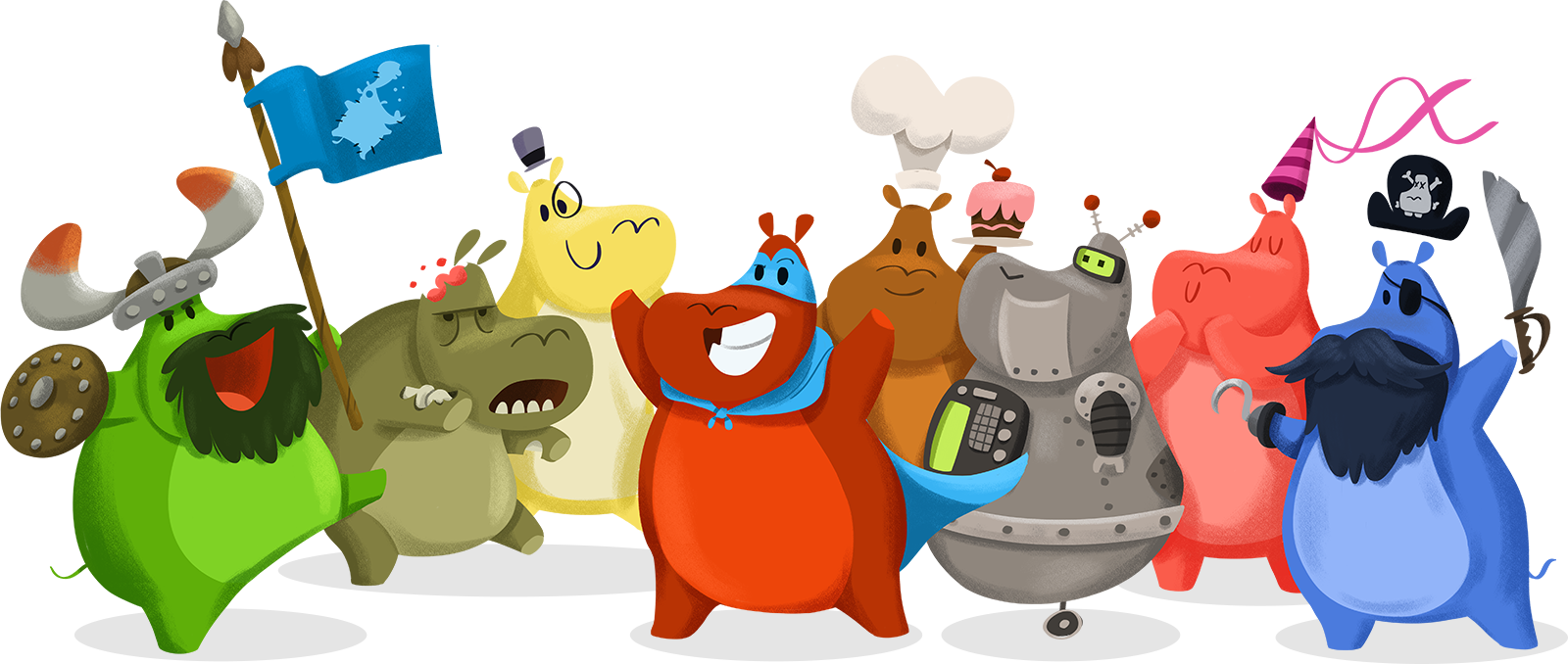How Many People Does It Take to Make a Video Game?
TL;DR… A game could take many people or just a few. My suggestion? Stay as small as possible.
I love what Supercell says about teams — "the best teams make the best games." It’s true.
There's a common belief out there that you need a big team to make a game. From my experience, you don’t. At least not when you're starting. From my point of view, having a big team is a big liability.
At its peak, over 1,000 people were working full-time on Club Penguin. We had offices in Brazil, Argentina, Canada, England, Australia, and the United States, with full-time people showing up to work, sitting at desks. It was a lot of work.
We grew from a team of four to over 1,000. Growth was the hardest thing. It was insane.
As you grow a game, you're likely going to think that you need more and more. But when the teams become bigger, the politics and process become bigger, and the work can get less and less fun. Although some people find politics and process fun, I do not. Everything gets more complicated as the team and the process expands.
Take a look at this picture, for example. It shows all the lines of communication between people with smaller teams vs. larger teams:
See how much simpler it is to communicate when you have a smaller team?
I believe in small teams just like Supercell. I've experimented a lot with team size. I've found the best quality comes from small teams focused on their strengths.
When we started Club Penguin, there was no Mailchimp, Amazon Web Services or the Cloud. There was no Intercom or Zendesk for support automation. We had to solve those problems ourselves, and we ended up hiring people to help.
But today, email deliverability and server scaling are solved for you. You can lean on third-party resources like Playfab and Community Sift to help you keep things simple and keep your team small.
What’s Your Vision?
Personally, I want to inspire and delight a billion players! I want to create games that generations of players will play.
Technically, I want to see 100,000 concurrent users in a single room. That's my vision.
To get there, I can't do it alone. And I wouldn't want to, either.
"If you want to go fast, go alone. If you want to go far, go together." -African Proverb
You can build something alone — but it's much harder, and it will take a lot longer. I could have built Club Penguin by myself and had it launched by 2010. Instead, we built a team and launched five years earlier, in 2005.
Back when I started RocketSnail Games, I had 3 goals written on my whiteboard:
Inspire others with imagination
Build with a team
Change the world
If you want people to join you on your crazy mission, you'll need to have a big vision or idea. A "why."
The "why" is what will keep you focused on your mission even when times get tough.
SIZE YOUR TEAM
If you're starting and want to make an MMO, you’ll need to start a team. But how big should that team be? And where do you start?
I would start with your first 3 people. You should all have different abilities.
Do not build your team just because you like each other. The goal is to have people who fill your weaknesses and cover your blind spots.
Then work your way towards 5 people. That's going to give you the expertise. That's going to get you from prototype to product.
TEAM SIZEs
Team size has always been a struggle for me. And it continues to be a challenge.
The truth is, there’s no “right” way to size a team. We experimented with this a lot at Club Penguin and Hyper Hippo, for example. In team sizes, I've felt that 3, 5, 7, and 12 are good. And I’ve always felt that 5-7 people is really strong.
The Pair — 2
The simplest team is 2 people.
A pair is the most basic team. It's the smallest starting point. A pair usually consists of one person with a big, crazy idea (what Seth Godin calls a "heretic" in his book, Tribes) and the first follower. The heretic is the nutbar with the idea that no one understands yet.
There's a great video about the first follower. Fantastic story. You watch as there's this person out there, dancing by himself. And then the first follower comes along:
The first follower validates the idea. You need your first follower to validate the idea. Then you have the beginning of an audience.
The Trio — 3
A team of 3 requires people who can wear multiple hats. In the case of AdVenture Capitalist, Cody was the creator, writer, game designer, and voice actor. Cody wore multiple hats.
Cody was the heretic with the idea that no one understood, including me. It wasn't until he got his first follower that his idea was validated.
Early screenshot of adventure capitalist alpha
A team of 3 (a trio or troika) needs generalists with skills in multiple areas. But when you have a team of 3, you don't have specialists yet.
I’ve not seen examples of best-in-class experts joining a team of 3 and executing on a product. I find that specialists trip in a team of 3. I think it’s because the experts tend to not become generalists.
Hex-Sized — 5
At 5 people on a team, I feel like I have the bases covered. From what I’ve seen, it's not until a team of 5 that you start to have specialties on a team.
5 is fun. It gives you that cool, SWAT Team-type feeling. Gaming is hard because it's a multi-disciplinary industry. 5 may be your absolute minimum in gaming.
In a team of 5, I’d start to see a team with some specialists, and I’d have a clear lead. I’d get a really good artist and a fantastic designer. I’d have a great writer. And I’d have an excellent programmer to build it out.
5 is about enough to sit down and show expertise in each field. But if you’re building a team of 5, you also have no redundancy or backup plan.
Lucky Number — 7
(Pretend there are actually 7 hippos in this picture)
In agile project management circles, some recommend a team of 5, 7, or 9.
At 7 people, you can start to get into pairs. You can have two writers. Two programmers helping each other code. Two artists helping each other. Two designers helping improve each other's designs.
I'm amazed when I hear numbers from teams like Supercell. You would assume that they have big teams, but instead they have tight, focused small teams. From what I understand, they have seven people on a project, and that's it. They call them "cells."
Big Team — 12
At about 12, you dive deeper into pairing.
You can now have 3 programmers, 3 artists, 2 writers. So teams are now starting to collaborate, and you get some really decent work. You will begin to have senior and junior members on your team. Mentorship begins.
Magic happens right on that edge for the product and the team. But at this size, things are starting to feel big…
Too Big? — 20
When I’d get a project that starts to get large (like Mech Mice did), I would break down teams into multiple teams. I would have a writing team and a game team, for example.
As you get close to 20 team members, I've found that you start to bring in the managers of people. Teams begin to focus on ‘disciplines’ at this point. Now you have an art team vs. a product team.
At 20, people start needing to have a manager. I don’t like the team of 20 size, personally.
At 20, you have a layer of managing people in addition to managing the product. Now there is more distance between the team and the audience, and things start to get less effective.
The team starts to serve a producer, and the producer begins to serve executives. And at that point, nobody's talking to the audience, as they're too far away.
The producers start to serve the executives rather than the audience. At this point, I believe there are too many layers. This is the breakout point where nobody's talking to the audience because the layers are so far apart.
The bigger teams get, the more they become a big system with policies and procedures and process.
My Approach Now
I believe in small teams. It’s worked best for me.
This may not work for everybody or every project. Big teams can work for some companies, but I prefer to focus on keeping teams small.
But if you do build a large team, it’s probably best to break that team down into smaller teams of 5 or 7.
Remember, what matters most is that you start!
Just start small, and do what you can to keep things simple.
I continue to learn and experiment to help my teams, and you’ll need to do the same if you’re looking to build an MMO like Club Penguin or a lifestyle game like AdVenture Capitalist.





